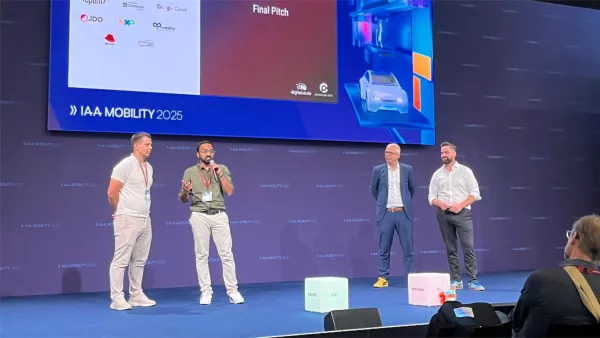
A master's student at RWU Ravensburg-Weingarten University wins an ideas competition at IAA Mobility 2025 in Munich for developing a software prototype to improve the charging process for electric vehicles.
Karan Sankla came to RWU in Weingarten from India in the winter semester of 2024/2025 to pursue a master's degree in Electrical Engineering and Embedded Systems. This program is offered entirely in English. “I had many options after completing my bachelor's degree and deliberately chose RWU because the university offers teaching and research with a hands-on mentality,” he reports.
Participated in the hackathon by chance
During the semester break, the 25-year-old is completing a voluntary internship at UNIO Enterprise, a NewSpace startup that delivers space-based connectivity for the mobility sector in Munich. “I don't actually have to do the internship, but I wanted to use the lecture-free period to gain some industry experience.” His participation in the hackathon, on the other hand, was purely coincidental: “I saw the announcement at the trade fair and signed up on the spur of the moment and a push from my team at UNIO.” A hackathon is a time-limited event in which teams work intensively on creative technical solutions or prototypes
The hackathon was organised by prototype.club and digital-auto. Karan Sankla registered in the “Bring your own device” category, in which a vehicle equipped with Bosch software interfaces was provided. Together with a partner assigned to him on site, Karan Sankla developed a solution for a common problem with regard to the charging infrastructure for electric vehicles in Germany within about five hours.
More efficient charging infrastructure
In the case of vehicles whose charging process has been completed, usually only the person who owns the car can release the charging station. This often results in the charging space being unnecessarily blocked by longer stays. Karan Sankla programmed a software prototype that reads the vehicle data from the car and makes the current status of the charging process transparent. Once the vehicle is charged, a release request can be sent for the existing charging station. If the other person agrees, the charging device can now be used.
Delving deeper
While his partner prepared the pitch, the RWU student took care of the coding. “We were a good team and didn't talk about personal matters at all – I don't even know which country my partner came from.” The jury ultimately selected the two-person team named “UnplugMe” as the winner. Karan Sankla would now like to delve even deeper into the subject area and build on the prototype in his master's thesis – or work on a similar topic. The award winner plans to apply for a relevant position in the coming semester.